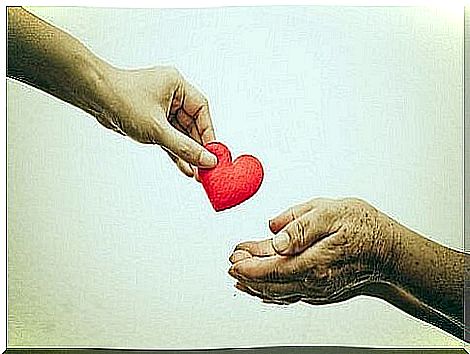Compassion Opens Our Hearts And Makes Us Happier

Compassion is our ability to understand the suffering of others and the desire to alleviate or reduce it. The concept of compassion is both simpler and more intense than empathy, as it invites us to help put an end to another’s suffering.
Self-compassion, on the other hand, gives us a compassionate attitude toward ourselves, especially when things do not go as planned. Learning to develop compassion is an ability that can help us feel happier and happier with our daily lives, as long as we do not abuse or wallow in it, of course.
Psychologist and researcher, Paul Gilbert, created a therapy that focuses on compassion. He points out that feeling this is not the same as feeling sorry for others. Rather, it is a motivation that gives us energy to help others, in a way that allows them to alleviate their own suffering with our help.
Components of compassion
The word compassion is sympathy, which comes from the word “sym” – along with, and the word “pati” which is used about emotion. It means we feel with someone. This is the feeling we get when we perceive the suffering of others and it provokes the impulsive desire to reduce this. The feeling is divided into different components:
- A cognitive component that includes attention and evaluation of others’ disorders, as well as recognition of one’s own ability to act when faced with this.
- A behavioral component that includes the commitment of each individual involved and the determination to perform actions that help eliminate the disorder.
- An emotional component that motivates us to act on our gut feelings, and generates emotional reactions that give us a sense of personal satisfaction. Our level of mental well-being depends in part on the type of relationships we create with others.

Compassion opens our hearts
This feeling helps us to connect to our hearts in order to put ourselves in the shoes of others. It opens the door to emotions, so that we can feel that we are experiencing the experiences of those around us. We feel what hurts or makes them suffer.
Compassion helps us to stop looking at our feet and begin to see what is going on around us. It reminds us that we are not alone in this world, that others are also important. Furthermore, if the help it brings is honest, it will bring us a tremendous sense of inner peace.
Being compassionate brings us closer to others and gives us the opportunity to give our best to help others with humility and closeness. Every time we care about someone who needs it, we enlarge our heart and offer the other sincere help.
The fear of compassion
Why do we not use more compassion when we have so many opportunities to do so? We do not give ourselves the opportunity to act with compassion because our focus is not in the right place. Social neuroscience has shown that our natural impulse is to help. We are prepared to offer it on foot. So why is it that we sometimes do not help?
Feeling compassion can make us afraid to act for different reasons. Here are some examples:
- We are concerned that helping others to alleviate their suffering will put us in a situation of vulnerability that may lead others to reject us.
- Observing the suffering of others makes us feel sadness that we may not want to feel.
- Compassion causes us to revive unresolved childhood wounds that prevent us from connecting with the suffering of others.
- We are worried that we will not be able to move past someone else’s suffering once we have taken it upon ourselves.
- We want to focus our attention on other things that we perceive as “more important”.
Self-compassion, the ability to accept ourselves as we are
Self-compassion is built by realizing our inner suffering, being able to understand its meaning, and let us accept it and treat ourselves with love. It’s a way to promote a loving attitude toward ourselves, especially when things go awry.

Compassion invites us to look at society as a transforming force, and bring the inner to the outer. Instead of filling us with self-criticism and judgment, self-esteem allows us to be benevolent and develops a loving adult in us, who cares for us and protects us every day. Suffering, instead of distancing ourselves from humanity, unites us to compassion.
4 steps to developing compassion
If we perceive the suffering of others and practice self-compassion, it is necessary to practice the way we view suffering. All we need to do is notice, realize that we are not alone, that there are always others who need help. We must not ignore. This means that when we come in contact with suffering, we can feel overwhelmed by our emotions. This is our second task, to learn to deal with the emotions that are born in us when we act with compassion.
Perceive suffering
Perceiving one’s own suffering and the suffering of others is the first step in the feeling of compassion. To do this, we must open our hearts so that we can come into contact with our emotions. For example, if we are on the street and we see that someone is suffering, we should stop for a moment to fully perceive the suffering instead of passing as if it were not our problem.
Evaluate the suffering of others
It is important to practice these skills without judging, because otherwise we will not be able to feel compassion. It also does not manifest itself if we have not completed the previous step of perceiving suffering. For example, if we think that the person deserves their suffering, then compassion can not be shown.
Feel the emotions fully
To open ourselves to emotions means to let ourselves fully feel the emotion and all the other emotions that come with it. Even if it gives us some suffering or discomfort. If we allow ourselves to be carried away by compassion, we will be able to reach a deep sense of goodness.
For example, if we see something that affects us on the news, we should allow ourselves to cry and not block these emotions. In this way we will be free to feel compassion.
Handle
When we can perceive the suffering of others, evaluate how great they are and feel them without censorship, we must act. We can not keep this feeling just inside. For example, get started trying to alleviate the suffering of a friend or family member. Give them the emotional support they so desperately need.
The positive effects of compassion
There are many positive effects for society and ourselves when we can feel compassion. According to the Dalai Lama, the power of compassion has the ability to:
- Encourage the type of education that focuses on empathy, ethics and personal development
- Create new economic systems that are fair to society
- Recognize that we are a single human species, where there is no difference between them / us or better / worse
- Develop dialogue and communication instead of violence
- Reduce social inequality by providing more transparency in all areas
- Put an end to cultural differences, in addition to prejudice and corruption

If we include compassion in our lives, we will notice significant changes. We can try to imagine that someone we love is suffering, and see what effects this causes in our body. Send this person feelings of kindness and compassion and see how different you feel. Try to send good feelings to someone who does not like us so much and see how you feel.
Mindfulness helps us develop this compassion that we can pass on to others. To develop compassion, we must create a mental space, as if it were our private consulting room. Here we can perceive the suffering of others and act. This is how we start. Each does their part to build a fairer and more generous world.
Changes in a society begin with us treating each other better, including treating ourselves better. Practice empathy and compassion for all. There are no excuses for not starting today. The sooner we begin to experience compassion, the greater happiness and well-being we will be able to feel in our daily lives.









